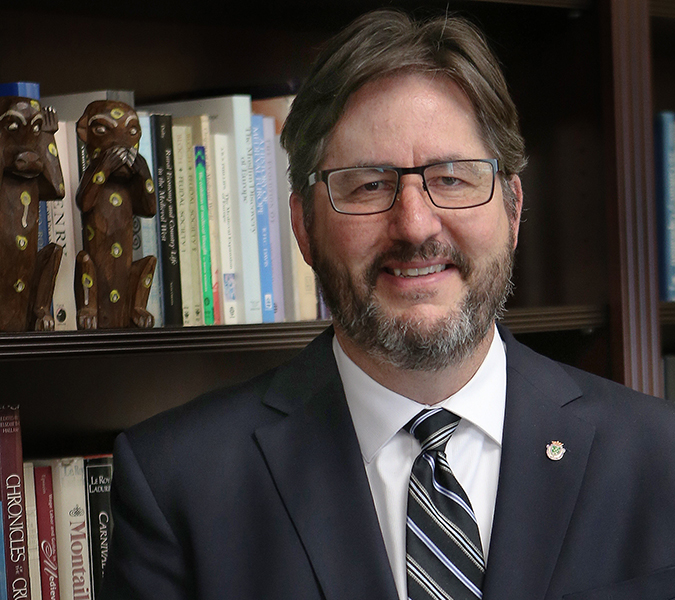The Mike sat down with David Sylvester to discuss his first year as President
Aaron Panciera EDITOR-IN-CHIEF
Photo: University of St. Michael’s College
On February 28, I sat down with the President and Vice-Chancellor of the University of St. Michael’s College (USMC), David Sylvester. We met in his office at Founders House, spacious enough to be a studio apartment and fully equipped with a working fireplace and more windows than walls.
We make small talk at first. A Medieval History Ph.D. with a particular interest in ships, Sylvester mentions that he has visited my hometown of Mystic, Connecticut for a trip to the historical Mystic Seaport Museum. In fact, he has an entire shelf dedicated to books on ships. A father of four and husband to another academic, it seems fitting that the Sylvester family would spend their vacation at the Seaport Museum.
Born in British Columbia, Sylvester has spent much of his life moving between academic institutions across Canada and the United States. After graduating from Burnaby’s St. Thomas More Collegiate, Sylvester attended St. Francis Xavier University and Simon Fraser University before graduating from Niagara University in 1984 with a Bachelor of Arts in French and History. Transitioning from one Catholic post-secondary institution to another, Sylvester received a Ph.D. in Medieval History at Fordham University in 1999.
Following this, Sylvester began his career in academia. He was appointed as the founding President of Corpus Christi College (another Catholic post-secondary institution) in 2000, before transitioning to Principal of King’s University College in 2009.
Sylvester began his five-year term as the eighth President and Vice-Chancellor of USMC on August 1, 2018. Still in his first year as President, our discussion was the first time that anyone from The Mike had sat down with Sylvester. We touched on many subjects, but the nature of our conversation consistently returned to the concept of community on campus.
“A social-economic historian, Sylvester’s area of research focuses on the nature of community in the middle ages,” a piece from the King’s University College archives reads.
From our conversation, it appeared that Sylvester’s priorities as USMC President aligned perfectly with his academic interests. This was especially evident as he explained the role of Catholicism at USMC.
“We do some things that are specifically Catholic,” Sylvester said. “And then we do things with trying to build a community that is inclusive, respectful, and honours the dignity of the human person.”
Sylvester sees inclusivity on campus and USMC’s Catholic identity as going hand-in-hand. More specifically, he sees inclusivity as a hallmark of the Catholic faith. When asked about the specific role of Catholicism on campus, Sylvester responded:
“It’s our raison d’etre if you like; it is why we were founded 167 years ago. It is very much a part of our mission, and it takes its shape in many different ways. First of all it means we’re inclusive — it shapes a pedagogy, a way of learning that is not unique to Catholic institutions and Catholic higher education, but it is consistently in and throughout Catholic institutions where we teach subjects, sure, but we first and foremost teach people.”
“The role of a Catholic university is — and I’m serious about this — when you treat people, you look at the dignity of the human person then that requires you, that calls you, that demands that you’re consistent in how you include people in the community.”
While the college’s Catholic identity permeates into USMC’s governance both in terms of institutional and academic — USMC has a Catholic ministry and church on campus, along with the Christianity and Culture programs offered and the prominence of the Faculty of Theology — Sylvester prefers to focus on faith as just one aspect of a Catholic education among many.
“So, we’re all made in the image of Christ, right? That’s the foundational to — regardless of if you’re Catholic or not — that’s the principal of Christian anthropology,” Sylvester posits. “And so we have many aspects. We have intellectual, we have spiritual, we have psychological, we have physical aspects that all integrate to make us a human person.”
We spent a sizable portion of our conversation discussing the roles and responsibilities of the President, along with his daily routine. In short, his routine has one consistent aspect: meetings. Sitting on boards such as the Federation of Humanities and Social Sciences, Sylvester often has to attend off-campus meetings before he even gets to his office. These external meetings tend to be followed by more meetings once he gets to campus.
“This morning I had a meeting with the chief librarian, a meeting with you, tomorrow I meet with Kate Strazds. We meet regularly with the St. Michael’s College Student Union (SMCSU) and other student groups. I have a meeting with faculty at noon. I’ll meet with the Principal prior to that, so I have a lot of meetings during the day. There’s investment, then there’s the board meetings — collegium is what we call it here — so there’s all kinds of committee meetings.”
From a governance perspective, Sylvester has a unique position among university Presidents. USMC is not only one of the three federated colleges, but is also its own university within the University of Toronto (U of T). He likes to describe USMC’s relationship with U of T as “institutionally autonomous but academically affiliated.” Sylvester continues to explain that none of the USMC administration works for U of T, instead working for USMC and the collegium. USMC’s academic policies are largely shaped by U of T. The college’s administrative policies, on the other hand, can align with U of T’s but often differ. Sylvester explains:
“Academic policy is very connected with U of T, certainly around the undergraduate piece, because over the last few decades we haven’t offered independent programs, only U of T programs, so there’s a very strong connection there and we sort of take our lead from that.”
“But institutionally, in terms of administrative policies, safety policies, or sexual violence policies — whatever institutional policy — those are ours. Now, we take our lead — we want to try and make sure that they’re connected, they’re not inconsistent with U of T’s, because that’s what works for students. St. Mike’s students live in a bigger world than just St. Michael’s so we try really hard to make sure they’re in harmony, but the reality is they have to be in harmony with our mission as a primarily liberal arts/theology/humanities/Catholic institution. So, there are some areas that are explicitly different. But processes to get there, those are entirely ours on all levels except for the academic policies.”
Almost halfway through the interview, I ask Sylvester if he believes that USMC accommodates LGBTQ students and students of non-Catholic faiths. I mention that USMC does not have the best reputation in this regard, to which he seemed genuinely perplexed. I mention an excerpt from Michael Valpy’s 2017 Toronto Star article, which reads:
“Several LGBTQ students have complained that during the past academic year they have experienced hostility at St. Mike’s because of their sexual orientation and asked to be transferred to another college, according to a senior U of T administrator who asked not to be quoted by name because he was referring to confidential student enrolment data. The administrator added that this would be an unusual and possibly unprecedented occurrence at the university.”
Sylvester still looked confused. His first response was, “I think what’s interesting in that quote is [the word] ‘unprecedented.’” After mentioning that he couldn’t go into specifics and making it clear that he wasn’t at USMC during this period, he goes on to defend USMC’s reputation.
“I don’t know St. Michael’s to be an intolerant place or developing policies that are exclusionary at all — certainly they aren’t now.”
“And frankly, in the Canadian context, St. Michael’s is part of Universities Canada, which is a collection of the major universities in the country — it’s the association of the Canadian universities — and we’ve endorsed principles of equity, diversity, and inclusion on our campuses. […] We’re called to do it as a Catholic institution and, legally, we’re in Canada and the Charter of Rights protects that. So, I don’t know that St. Michael’s has or deserves a reputation for being exclusive or intolerant — and it shouldn’t be and won’t be. I’ve made that commitment my whole career. We have a responsibility to find and welcome students where they are and help them grow on their journey — their intellectual, their spiritual, their personal, their psychological — their journey. That’s what Catholic education is about. It’s not about a litmus test of who’s in and who’s out.”
Despite this, Sylvester was defensive of the previous Mulroney administration defined by its crackdown on party culture at USMC. After insisting that it was not his place to comment on previous administrations, he finally addressed the topic, and did so rather extensively.
“I will say that, in the future, David Mulroney’s legacy at St. Michael’s will be a positive one. I look around at the new professors that are on this campus — St. Michael’s was moving in a direction of more and more sessionals, and he took the bold step of supporting the hiring of new, young faculty that can mentor students. He undertook the renovation of Brennan Hall, which is an important piece because the community was being fragmented. He engaged with students in the way that he thought was appropriate.
“But overall, I think his reputation and his legacy will be a positive one down the road. My job is to create an opportunity for students to grow and flourish, and if there are things that are affecting that negatively, I would address them as well.”
Regardless of these comments, the two could not be more different. Mulroney was best known for his tenure as Ambassador to China. Sylvester’s professional background is almost exclusively in academia. Sylvester can be seen many days walking around campus conversing with students. During my first two years, including my first year on residence, I had very little contact with Mulroney. Sylvester is calm and friendly, talking candidly with me on all aspects of student life. In my limited encounters with Mulroney, I never once saw him smile.
Despite differences in demeanour, Sylvester is adamant that Mulroney made the best decisions for the college. However, while doing so, he commends student leaders on campus and speaks highly of the student body in general.
“I can tell you that if I saw that as a problem I would probably address it too. You can talk to the students right now, I engage with SMCSU and others on all kinds of levels. If there were problems I would raise the concern. I don’t see problems right now, I see incredibly creative, engaged students and leaders here. I don’t know what David Mulroney encountered, but part of my job is to work with students and work to build a healthy, positive, joyful community.”
This provided a segue to questions about Sylvester’s relationship with the current SMCSU executives. He has been very involved in this year’s council, maintaining an open-door policy for executives and gushing about various SMCSU initiatives such as the installation of the ice rink and an exploration of how to make the USMC campus more accessible.
“ I can’t meet with all 5,000 students — I try to — but SMCSU is representative of that group and so I can communicate with them and they can communicate with me. There are really positive things [that SMCSU does]. You know, the ice rink. One of the biggest things I learned a long time ago is to support people with good ideas and get out of their way.”
“SMCSU has had some really positive, creative ideas that we talk about to make sure everything is good, then I get out of their way. So, organizationally, we have an open door, we meet all the time. I am energized by their love of this place and their desire to create opportunities for students socially as well as academically. There’s been some things that SMCSU has done this year that are — they are exploring, I should say — around accessibility and disability stuff because our campus, like all of U of T, is not where it needs to be. It’s horrible.”
When Sylvester says, “ I think you need to have students at the table when you make important decisions,” he seems genuine. He is clearly passionate not just about academia or USMC, but about the community; the students, faculty, and staff that make up USMC.
“Sometimes [working with student leaders can be] really challenging, sometimes you shake your head, but other times you’re just like, ‘Wow,’ and you get out of their way because they’re doing really good things for students on campus. […] I do know that SMCSU’s in a really good place now from my perspective.”
Any and all dialogue on student unions today inevitably leads to one topic: the Ontario government’s Student Choice Initiative (SCI). The SCI essentially mandates an opt-out clause for all “non-essential” student fees, including student unions and campus publications. Sylvester — in the same boat as everyone else —knew little regarding the logistics of the SCI. The topic of conversation shifted between what this means for SMCSU, The Mike, as well as his own personal thoughts on the initiative.
“Let me just start by saying, the fact that The Mike is non-essential is ridiculous. The student voice on campus is absolutely essential and no outside entity, governmental or other, should be in a position to shut down that student voice.”
“There’s not a university President in this province that would support that position, that the kinds of student services that The Mike would represent, and others, should be seen as opt-out.”
He even goes so far as to call the initiative Orwellian, a description that has been used as recently as October 2018 by the club Socialist Fightback U of T to describe the provincial campus free speech mandate.
“I mean, it’s a little bit like 1984 in some respects, and it’s unfortunate. It is unfortunate, those decisions that were made were unfortunate.”
In regards to potential action on the part of the college, Sylvester seemed pessimistic about the chances of USMC being able to subsidize SMCSU and The Mike’s potential lost revenue.
“I don’t know what I’m allowed to do; ‘I’ meaning the institution, what the administration is allowed to do, but SMCSU knows I’m behind it,” Sylvester said. “It will be crazy for an arguably arbitrary decision across the street at Queen’s Park to silence a proud tradition like The Mike. Some students have voted with their feet in demonstrations. Others should make sure they opt-in.”
Sylvester ended our conversation on an optimistic note for The Mike. While unsure what his administration could do logistically, he stressed that The Mike is vital to the USMC community.
“I’m hopeful that students will realize that over 70 years of The Mike, sometimes it was brilliant, sometimes it was not so brilliant, but it’s a necessity. It’s part of the life here at St. Mike’s and it’s part of the culture, and students need a voice. And if they don’t opt-in, why are they here?”




